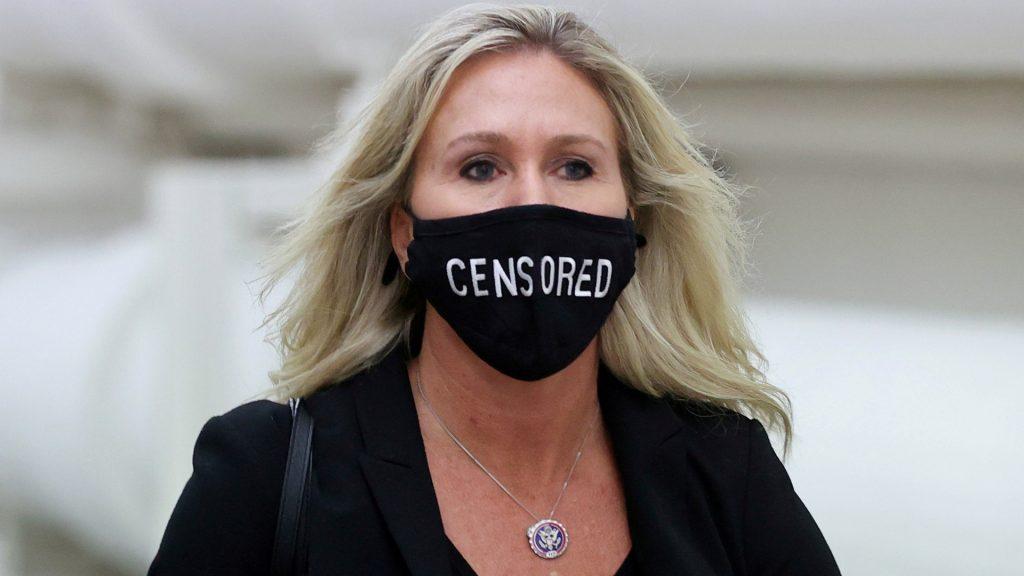Muddiness is not merely a disturber of prose, it is also a destroyer of life, of hope: death on the highway caused by a badly worded road sign, heartbreak among lovers caused by a misplaced phrase in a well-intentioned letter, anguish of a traveller expecting to be met at a railroad station and not being met because of a slipshod telegram.
E.B. White, The Elements of Style
The problem with that is, though, is that I was allowed to believe things that weren’t true and I would ask questions about them and talk about them.
Georgia Representative Marjorie Taylor Greene, February 2021

In school, we were taught to avoid the passive voice. Or rather, our teachers taught us to avoid it. Why? Because the passive voice, it is said, is less vigorous and direct than the active voice, which favors boldness of action and expression.
When I got it back, my paper was so covered in corrections, it looked like a crime scene. Red marks were everywhere, to the point that it was no longer legible. There were a lot of mistakes in spelling, punctuation, and other things. It was hard to know how it would be possible to make all of the corrections I needed to make to pass it back in.
The teacher savaged my paper with a red pen, underscoring my every error in spelling, punctuation, and verbal tense. I steeled myself and then dove into the wreck and addressed each problem, one by one.
Let’s dust off this vague, primer-bookish memory and remind ourselves of what is happening, grammatically. The passive voice is a verbal construction that places the object of action in the place of its subject. It obscures the source of action, and therefore its origination, at the level of the sentence. The passive voice becomes “indefinite,” writes Will Strunk and E.B. White, our elder spokesmen for American style, and muddles the question of whom is in charge–or is it who is in charge–“is it the writer or some person undisclosed or the world at large”?
The election was stolen, the system is rigged, mistakes were made. Things have been looked at, I’ve heard it’s true, it’s been said all the time, people really do say it frequently, though I have no idea if it’s true.
The passive voice has special difficulty communicating subject-verb-object kinds of events–plotlines with causes and effects, intents and outcomes, motives and consequences–and therefore, it is a construct tailored to avoid the direct assignment of agency. It frames a subject more acted upon than acting, and such a person is caught in a conundrum. From syntax to zeitgeist, it turns out that verbal passivity leads, indirectly, through wordy and circuitous paths, from grammar to the public sphere and there, in the town square, for everyone to see, fingers are pointed elsewhere.

More pitfalls of the passive voice. The passive voice absolves and forgives itself of sins. It projects responsibility elsewhere, to “some person undisclosed,” or to “the world at large,” and accepts none for itself. Having positioned itself in this impotent, blameless posture, our put-upon passive voice easily raises the ante from innocence to helplessness to injury to victimization. The passively voiced pickle of agency marinates in the barrel of projected, imagined persecution and becomes even saltier and more unpalatable. And yet, immersed in that briny medium, it continues speaking, producing mixed and bitter messages for the world to hear, to absorb, to repeat, to become familiar and iterable: an ideal posture for submission to propaganda and a fertile ground for free-falling conspiracy.
Vocal passivity has at hand a number of imitative strategies. Recently heard, shouted from a bullhorn: “The Million MAGA March,” which drew a few hundred Trump supporters to Washington, D.C. following the November 2020 election. The phrase is but pale mimicry of “The Million Man March” of 1995, which mobilized hundreds of thousands of African-American men to D.C., in order to bring focus to matters of inequity, mass incarceration, building community, promoting positive identity, and assisting in voter registration. Likewise, the slogan “Blue Lives Matter” is but a cynical substitution-and-reversal of “Black Lives Matter,” a move that insults and dilutes and diminishes the message of BLM, a movement shedding light on police brutality in particular against African American men. In its theft-and-switch strategy, the defensive posture of the second slogan reveals an identity of mimicry–derivative, unoriginal, and lacking in primary agency.
A more situational example of passive stylistic imitation. From the White House dining room on January 6, happily taking in the live-feed of insurrection on FOX, Trump tweeted about Vice President Pence, as his supporters violently disrupted the final act of counting the electoral votes, the final seal on the democratic outcome of Trump’s loss. In those 140 characters, Trump essentially laid blame at the feet of his most loyal submissive and raged at Pence’s failure to overturn the election results. As the Tweet circulated instantaneously through the ether, a rioter outside the Capitol read the tweet aloud through a bullhorn, repeating it verbatim, targeting the address of the Tweet to those who would do something about it, which we know they had the means and intent to do. Trump may have even watched this closed semiotic circuitry play out, in real time, from his White House perch. The rioter who repeated the tweet gave his voice over to Trump in slavish imitation, his bullhorn at once echo chamber and broadcast medium. The message thus relayed found its two-tiered audience, both bound by the rules of mimicry, the followers of Twitter reading from afar, now scattered to the dark corners of the parlerverse, and those quite near, on the ground at the Capitol, bearing nooses and bear mace and zipties.

How shall we understand this culture of pervasive mimicry? What remedies can we imagine to reverse its anti-democratic momentum? The terms we use to pose the question matter, and several approaches to the problem are now emerging. An adaptation of the recovery movement for the political sphere, focusing upon an addiction model. A focus on deprogramming, borrowing from the treatment of cult members for mass delusion. Looking at the problem a little differently, through a stylistic lens, we can see the passive voice as a problem of form and content.
A stylistic approach attends to the ways that form shapes content, positions it and frames it and thereby tracks the way it conveys meaning. Subjective agency–or lack thereof– is often indicated in the very simple formal expression of a sentence. “I was allowed to believe things that weren’t true, and I would talk about them and ask questions about them.” Mimicry, reiteration, echo: the passive voice sustains a narcissistic economy of signs and guarantees its circulation in a broader system of meaning. Entirely vertical, messaging arrives from above, and it is repeated from below. It demands repetition as a sign of fealty and as the condition of inclusion. Variations on the theme of echo are its only rhetorical range. Iteration and reiteration are everywhere affirmed, liked, and recirculated, and liked again. The narcissistic economy of signs restricts critique and ultimately sets severe limits on the expression of voice. In this way, the passive voice becomes, in effect, a formal sign as well as a telling emblem of this closed semiotic system, Echo’s whispers of the brash song of Narcissus.

Submission simultaneously animates and deflates the passive voice, giving it a place of speech and, at the same time, eviscerating its expressive range. Masochism, usually understood as the sadist’s partner in crime, here fulfills the circuitry of narcissism, the only and default position for those who populate this semiotic system. Those who speak differently are shunned reflexively and aggressively, expelled as dangerous intruders decidedly unwelcome in these zones of mimicry. It would be tempting to consider this a failure of imagination–its poverty and vacuity–nothing more than a superficial deficit. But this pervasive depletion of style is significantly more. If a range of stylistic expression is so severely limited, and if any stylistic variation or invention at all is impossible, residents of the narcissistic economy have no voice other than the passive one, no stylistic range than that of imitation. The absolutely vertical, narcissistic economy is, at the level of signs, a prison house of authoritarian language.
In the topsy-turvy passive voice, what counts as reliable information, circulating through familiar channels, abruptly becomes the very source of cancel culture. The free press principle actually produces censorship, while conspiracy theory–fighting against the raging, hegemonic waters of the mainstream–dares to tell the truth. In the dystopian funhouse, the real authoritarians are the deep state institutionalists who have already taken over; they’ve brain-washed our children with social justice curriculum and taken away our sacred sing-songs. They police our very thoughts. The true anti-authoritarian lovers of freedom and protectors of the Constitution are those brave souls who risk life and limb to overturn a free and fair election. They smashed through the tyrannical Capitol establishment on January 6 and, brandishing a perilous misreading of the First Amendment, in spite of everything, they spoke truth to power.
It is a strange feature of American Authoritarian Style that it grabs hold of our imagination when dressing up in a rebel’s uniform and speaking in the impassioned tropes of American authenticity, as anti-authoritarian, as patriots rising up against a projected totalitarian elsewhere. When propaganda presents itself as truth, when citizens can no longer tell the difference between reality and falsity, when evidence is cast as mystification and as deception, just as Hannah Arendt predicted, meaningful discourse has already given way to nihilism. When such toxic communication takes hold in a culture of pervasive mimicry, when critical agency and the capacity to decipher and to evaluate information no longer prevails, authoritarianism has gained powerful footing. Authoritarian styles flourish under these conditions, to invoke Arendt once more, when anything can mean everything and nothing is true and cynicism becomes the default shruggish stance. The passive voice, in this disfiguring hall of mirrors, is disturbingly well suited to such an ideological-rhetorical sleight-of-hand. To counter it may require the return of an actively dialogical voice–one skilled in the transaction of signs and symbols, in the desire to negotiate meaning, to engage in multidirectional communication, to participate in interpretive exchange, to flow in the currents of historical adaptation–which, in ironies almost too deep to fathom, has been cast in the role of the real authoritarian.

